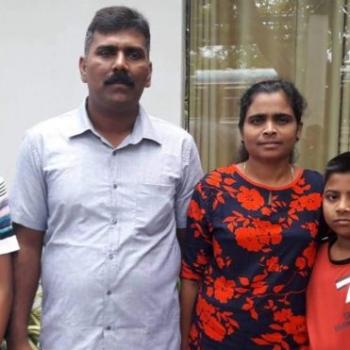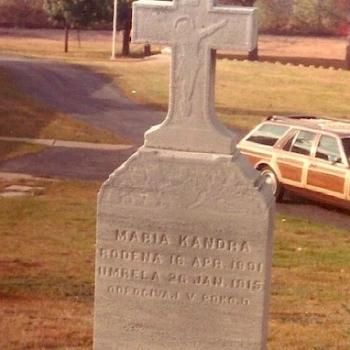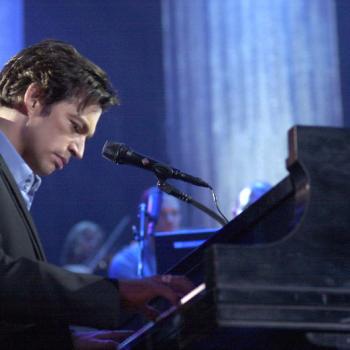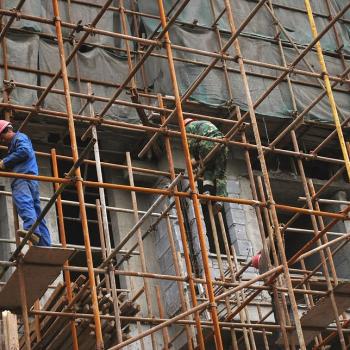Of all the remarkable moments that marked Derek Jeter’s last home game Thursday night, there is one that really struck me.
You might call it a home run.
Before leaving the field for the last time, as the crowd roared, Jeter walked to his spot where he played shortstop, crouched down, bowed his head, and made the sign of the cross.
Derek Jeter wanted to pray. For a moment, that great cathedral of baseball, Yankee Stadium, became a small chapel, a place for a private devotion.
Later, he told a reporter:
“I say a little prayer before every game and I basically just said thank you.”
This grandson of a Catholic school custodian remembered where it all began.
In a moment that was both very public and very personal, he reminded us all of what matters.
Now, I’m not going to canonize Derek Jeter this morning. But I think what he did showed grace, and class, and humility, the kind Paul wrote about in his letter to the Philippians. In our secular age, it was an act of faith. And it served, too, as a kind of challenge to a cynical world—the same challenge Jesus posed in the gospel.
Jesus essentially told the chief priests and elders:If you think you have it figured out, think again. Take another look at what you think is important.
You can change your minds—and change your hearts.
“Change,” in fact, is a significant word in this gospel. It pops up twice: describing the son who does change, and describing the chief priests and elders who don’t.
Some commentators have compared this passage in Matthew to the parable of the Prodigal Son in Luke; both stories revolve around two sons, and a choice, and change.
It is clearly a theme that Jesus wanted to drive home again and again to his listeners. It is one that has echoed down through history as the Christian faith has been passed on: the notion that there is another way, a better way.
The Father’s way. The Father’s will. He is calling. Are we listening?
The fact is, he has something in mind for each of us.
Blessed Cardinal John Henry Newman put it beautifully:
“God has created me to do Him some definite service,” he wrote. “He has committed some work to me which He has not committed to another…I am a link in a chain, a bond of connection between persons. He has not created me for naught. I shall do good; I shall do His work.”
It isn’t always easy. But if we listen to what God is trying to tell us, follow the direction he’s trying to take us and trust in his will for our lives, we may be amazed at where he leads us.
Twenty-five years ago, a young man named Peter Day was embarking on a career as sportswriter in Australia. “Sports,” he once said, “was my religion.” He didn’t pay much attention to his faith. “I had your standard boring Catholic upbringing,” he said, “and usually went to Mass just at Christmas and Easter.” As he was climbing up the career ladder, he got a job working for Australian radio. One Sunday, with nothing else to do, he wandered into a church. He found a seat near the back. Mass was underway. But it was unlike any he’d ever experienced before.
It was a Mass for the homeless. All the people around him had no place to live, no place to call home.
“I remember sitting there among all these poor homeless people,” he said, “And the gospel just came alive for me.” That moment was transformative. He knew he couldn’t keep doing what he’d been doing. He’d found another religion besides sports.
A year later, he entered the seminary.
During his formation, he asked the archbishop for a special assignment: he wanted to live and work among the homeless. The archbishop agreed.
For eight months, Peter Day lived at the bottom of a stairwell with nothing but a mattress. He showered in a public toilet. He lived among the lonely, the fearful, the depressed, the mentally ill. When he was ordained a deacon, the ordination took place where he often volunteered: at a Matt Talbot center for recovering alcoholics.
A few months after that, he was ordained a priest.
Today, Fr. Peter Day runs a charity for the homeless in Australia. A guy who once seemed destined to have everything he wanted serves those who have nothing. He has never felt more fulfilled.
“This is why I was ordained,” he says today, “to walk alongside those who are most vulnerable.”
It’s a far cry from what he was doing 25 years ago.
But at a critical moment in his life, like the son in the gospel, Peter Day changed his mind.
Now, working with the homeless, he is himself an agent of change.
Changing lives.
Changing circumstances.
Changing minds.
Are we open to change ourselves? Are we open to changing ourselves?
Are we open to God’s work in our lives? His will for us?
This gospel today is nothing less than a call to change, a call to conversion. It asks us to reconsider the choices we have made.
It asks us to remember, as Derek Jeter did, what matters and where it all began.
If we haven’t taken our faith seriously, take another look.
If we’ve thought, “I go to Mass a couple times a year, that’s enough,” think again.
If we have said “No” to God, pray for the wisdom to change that choice, and ask for the courage to say “Yes.”
God is summoning us, calling us, challenging us—just like the father did with the two sons. He is asking us to do his labor in the vineyard, to do his work in the world.
What is our answer?
Remember the words of Cardinal Newman—words that offer each of us consolation, and clarity, and purpose:
“God has created me to do him some definite service…He has not created me for naught. I shall do good; I shall do His work.”












